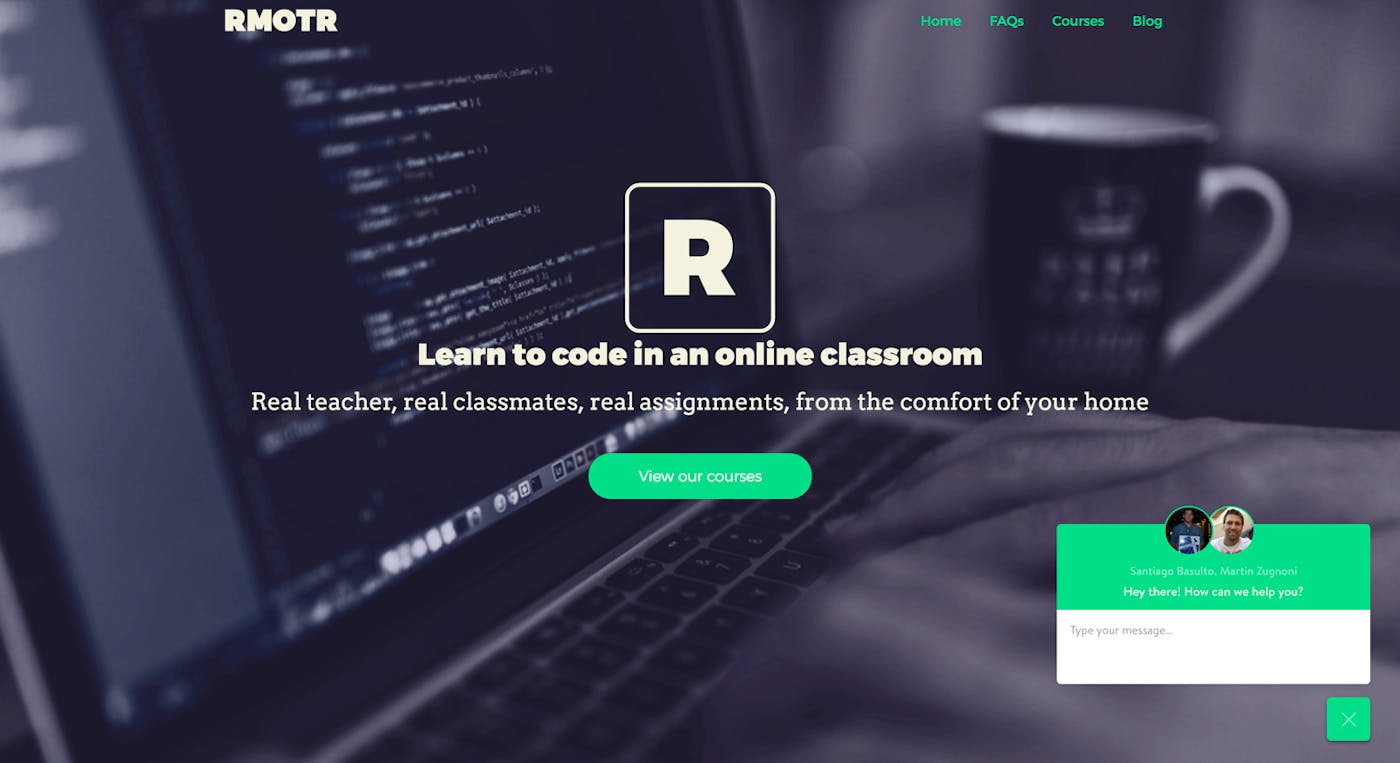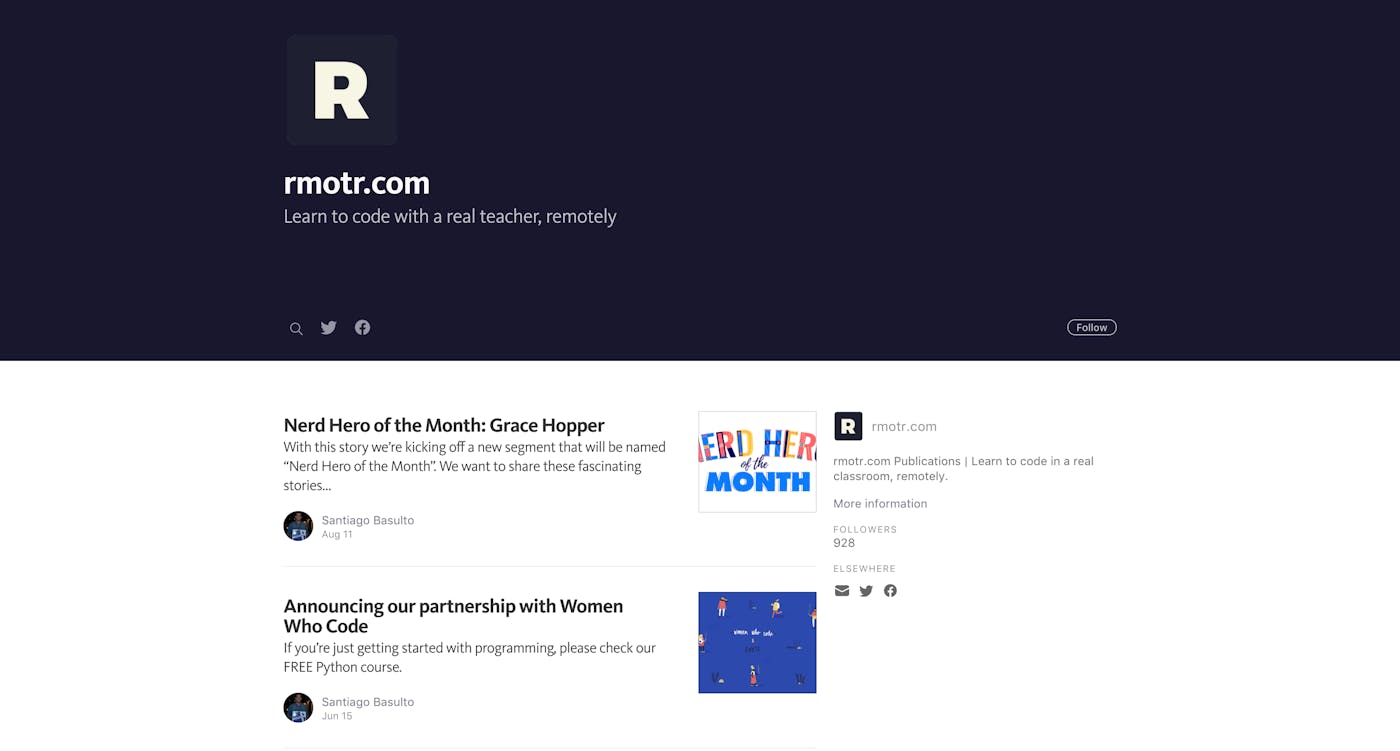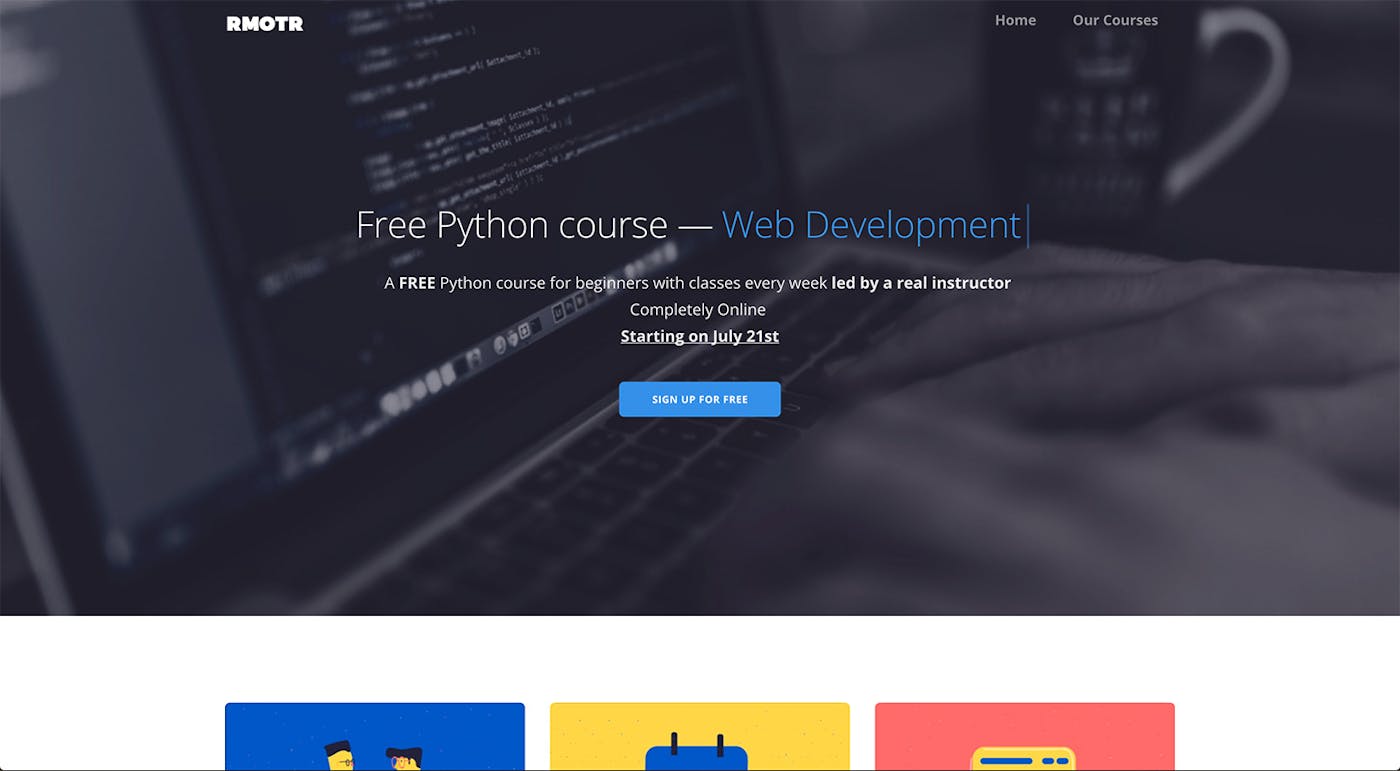Waiting Until Our Idea Was Validated to Write a Line of
Code
Hello! What's your background, and what are you working on?
My name is Santiago. With my co-founder, Martin, I've created rmotr.com, an online programming bootcamp specialized in Python and React/React Native. We help bring the world new hackers 👊.
We created rmotr because we were dissatisfied with the current available options for programming education. We liked the convenience and affordability of remote/online courses, but we knew that just sitting and watching videos wasn't the best educational experience — in fact, we suffered from this ourselves.
I remember when the wave of new MOOCs (massive open online courses) hit. We tried several times to complete Andrew Ng's machine learning course, and for some reason, we always ended up dropping in the middle of it. We thought, "How cool would it be to have a remote environment, but with real teachers and classmates?" Or, to put it more simply, to port the traditional education model to a remote environment.
When we created rmotr we decided that we wanted to improve the way coding was taught. We had been involved with teaching at our local college for more than eight years, and we were always looking for ways to improve it. With rmotr, we realized we had the chance to put in practice all the ideas we had gathered through all those years.
We've now come to a great educational model that combines a true human experience with the convenience of remote work. We've taught more than 500 students since we started, and we haven't spent a single dollar in advertising.

What did it take to build and launch the initial product?
We had recently failed in a completely different startup, and to cope with the frustration we decided to take some time off, go back to traditional consulting. We kept hanging out as friends, but we didn't have a clear intention of returning to start something new.
Then two things happened: as I said before, I ran into issues trying to complete courses for various MOOC applications. I'm a really distractible person, and it's tough for me to do something without a strict schedule. I liked the idea of learning from home, but I needed something closer to the traditional education model.
In the meantime, Martin was teaching operating systems and systems programming at our local college, and he was really dissatisfied by the way the classes were taught. He tried many times to make changes, modernize the curriculum and tools, and improve the methodologies, but he always got a sound "no!" as an answer.
So, given that we hadn't moved on to start our own new projects yet, we decided to fill that "adrenaline gap" by teaching people to code. We would make it a part-time activity in order to help people and also feel satisfied with a complementary activity. It was kind of like a local reading club, but meant to programmers.
So we started small. In our previous ventures we'd written a lot of software and we'd acquired close to zero customers. So we challenged ourselves and decided two important things. First, we'd start without writing a single line of code in order to test the concept and our ideas. Second, we'd start charging from day one, which is the only true way to know your service is really helping people.
In the following weeks, we put together an alpha version of our ideas using Google Docs, Hangouts, online IDEs, and forms. We used every available service out there to create our initial version, and we were ready to test it. We posted in /r/learnprogramming to get a feel for what other coders were experiencing. Then we put our first version out there for free to help us test our MVP — though we started charging a minimum of $50 for our second edition.
How have you attracted users and grown rmotr.com?
Word of mouth is our main source of new student acquisition. We put a lot of effort into our product and into giving our students the best experience possible, and we get rewarded with possitive feedback. I'd say that investing in your own product, and especially investing in helping and serving your customers, is your best marketing strategy.
Since day one we've also been committed to providing learning opportunities to people that haven't had the resources to pay for our courses. We've set different scholarship models with associations like WomenWhoCode and DjangoGirls, which has given us a lot of exposure to paying customers.
We also went the traditional route in taking care of SEO and other common marketing strategies. We have a pretty strong content marketing strategy, which was kind of a fortuitous discovery, to be honest.

From the beginning we generated a lot of content for our own students, and we decided to make it all free and open source. We weren't aware that so many customers would find us indirectly after discovering and enjoying our content. A good example is the free flask tutorial that we created, which now drives a lot of traffic our way.
Recently, we released a free Python course for beginners, similar to what we do in our standard classes. It's a little bit more condensed, as it's just one class per week, but it still provides a great experience.
We did it to get awareness of our current courses, but also to help our students get started with programming. Most students aren't comfortable paying for a course when they're only getting started — even if it's a great course. They simple have too many doubts: maybe they won't like it, maybe they won't feel comfortable, etc. So the free course makes it possible for them to get their feet wet. And if they like it and want to continue, they already know us.
How does your business model work? What's the story behind your revenue?
Our business model is extremely simple: we charge our students a set amount per course. We currently have two courses — Introduction to Progrmaming with Python and Advanced Python Programming — and one specialization: Web Development with Django. We're currently working on a Data Science specialization, which we'll announce soon.
As I've already mentioned, we started without writing a single line of code. Everything around rmotr.com has been a great subject of experimentation, and pricing is the best example. It's been by far the most complicated thing we've had to figure out.
When we started we charged $50 per course. We didn't know what was cheap or expensive. We made a few changes, increasing and decreasing the price, until one day we stumbled upon our "lucky" number. An ex-student emailed us thanking us for all the help we'd given him. He'd gotten his first programming job. He said, "Those were the best 50 bucks I've ever invested," as he had received an offer close to $70K/yr for a junior position.
This meant we had charged him less than 0.1% of his first year's salary. It sounded a little bit too cheap, but gave us a notion about how to tune our pricing in a manner relative to the value we'd be offering.
Today, the price is about $800 for both courses (with a discount for attending both), which sets the cost closer to 1% of a junior developer's salary. But we're still tuning things as we improve the learning experience.
Our biggest costs rely on our mentors. (We have real people helping, and we're paying them competitive salaries.) The good news is that all our mentors are ex-students, so it's really easy for a student to transition to the mentor position without having to go through a long training process. It also makes the process on our end much easier when we need more mentors.
What are your goals for the future, and how do you plan to accomplish them?
Our biggest goal for rmotr.com right now is to finish the Data Science specialization and keep growing. We know we haven't achieved all our potential in terms of customers, but our product is still not as scalable as we want.
That said, it has done great as an MVP (even after 16 months), and it's not only keeping the lights on but also helping us learn a ton and improve our experience and product.
After we solve these issues we're going to dive deeper into other technolgies, focusing first on Javascript.
What were your biggest advantages? Was anything particularly helpful?
Our biggest advantage, by far, has been the team we've built. We're all extremely passionate about what we do, and every new person that joins, even if she joins to mentor for two hours per week, shares the same passion.
Education brings passion. It's great to be profitable, but education is one of those spaces that has the alternate advantage of personal gratification.
What's your advice for indie hackers who are just starting out?
Well, I think this will be pretty standard, but here goes: start right now! Don't waste any more time. Just get started. We all know that a crappy product alive is better than a great idea in your mind.
And more importantly: focus on the team. Having a good, trustworthy, and tight team is the key to success for any startup.
Another important thing is sales. If you're solely a hacker (as Martin and I used to be), I'd recommend that you get started with sales as soon as possible. We hackers never pay enough attention to how important sales are. To give your first steps, I'd recommend the Little Red Book of Selling, by Jeffrey Gitomer. It's short and basic, but it's an incredible resource. If you're a little bit more experienced, I'd recommend SPIN selling, by Neil Rackham — especially for B2B businesses.
Finally, there's a book that I try to read every year. Seriously, it never gets old and I always get something new and valuable out of it, and it's Rework, by Jason Fried and David Heinemeier Hansson (the Ruby on Rails guy) from Basecamp.
Where can we go to learn more?
If you're looking to get started with programming, I'd like to point once again to our free Python course. We know how tough it is to take your first steps. Today's problem is that we have too many options to learn, and we get a little bit dizzy. If you're not too sure about it, you can still join our Open Python community on Slack and see what everyone is talking about.

We encourage you to leave us your comments or questions. We'll try to be as responsive as possible, and we're always willing to help.

I also took the Python course earlier, it was a pretty good experience. I wanted to develop in data science and managed to work at some small projects as a freelancer. Good days. Right now I'm studying IAS at www.chinmayaias.com/ , and when I finish and start working in my field, I will resume my part time free lancing job.
I took Advance Python Course with RMOTR, and they are awesome